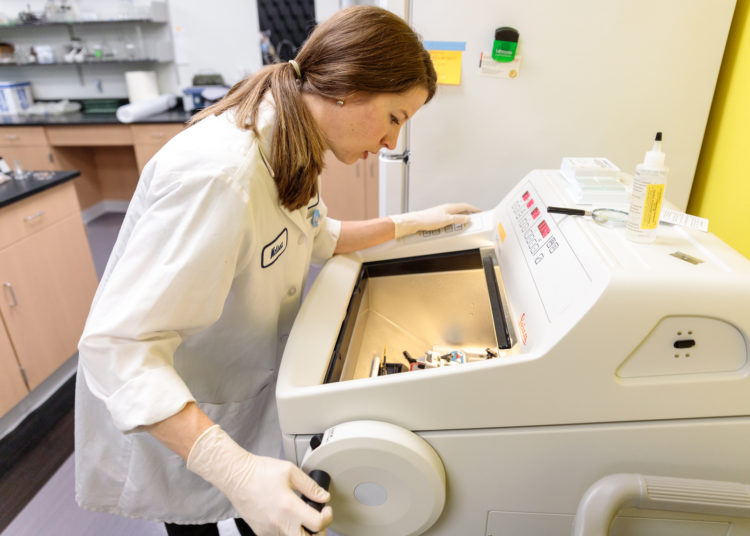
People with Alzheimer’s disease can have up to an 87-fold increased risk of seizures. Patients with early-onset Alzheimer’s have the highest risk for seizures, but even patients with late onset Alzheimer’s disease are at high risk.
Despite the risks, little is known about how genes associated with Alzheimer’s disease may affect a person’s susceptibility to seizure across their lifespan. Even less is known about whether anticonvulsant drugs, which, historically, have been tested in young-adult animal models, are effective and well-tolerated in older populations, including those with Alzheimer’s.
Plein Center researcher Melissa Barker-Haliskihopes to answer this question using preclinical mouse models with Alzheimer’s disease-associated genetic risk factors. Melissa is a neuropharmacologist with expertise in preclinical epilepsy models for anticonvulsant drug discovery. In collaboration with neurogeneticist and UW School of Medicine’s Suman Jayadev, MD, Melissa and her team are investigating how seizures in these preclinical Alzheimer’s disease models age-dependently affect disease trajectory and cognitive outcomes, as well as how anticonvulsant drugs affect seizure control in mice with these Alzheimer’s disease-associated risk genes. Using a mouse model with a mutation in one of the most common early-onset Alzheimer’s disease-associated risk genes (presenilin 2 [PSEN2]), they see how age affects the mice’s susceptibility to seizures and whether those seizures age-dependently respond to available anticonvulsant medications.

Melissa and her former undergraduate student, Megan Beckman (BS ’18), will present this research at the Investigator’s Workshop of the 2018 American Epilepsy Society Annual Meeting. Megan received one of 20 highly competitive Young Investigator’s Award from the American Epilepsy Society to offset the costs to present this research work in December in New Orleans, LA. Melissa and Megan’s research shows that many of the approved anticonvulsant medications reduce seizures in aged mice that carry the PSEN2 mutation.
However, clinical studies in Alzheimer’s disease patients are still needed. This work points to the potential positive impact anticonvulsants have on seizures in adults with Alzheimer’s disease, and also may inform anticonvulsant medication usage in the general population of older adults. As older adults represent the fastest growing patient demographic with epilepsy diagnosis, preclinical and clinical studies of anticonvulsant drugs in these individuals is clearly warranted.
“An implication of our findings is that patients with Alzheimer’s disease could benefit if clinicians and neurologists examined their patients early in the disease course to determine if they are experiencing seizures.” —Melissa Barker-Haliski, Research Assistant Professor, Pharmacy
From a clinical perspective, the good news is Melissa’s preclinical research aligns with the few clinical studies demonstrating that anticonvulsant drugs often work well in older adults, which may indicate their seizures can be controlled. People with Alzheimer’s disease commonly present with seizures that are not the “grand mal” type with generalized tonic-clonic convulsions. Seizures in older adults are often focal or what’s historically called complex partial seizures—which can seem like a mild stroke or may be called a “spell”—and patients may be disoriented afterward. These seizures can be difficult to distinguish from common symptoms of Alzheimer’s disease, making it challenging for clinicians, patients, and their families to recognize when and if seizures occur, further delaying anticonvulsant use.
Some anticonvulsant drugs can even impair cognitive function in patients with epilepsy, so their use in people with Alzheimer’s disease is a decision clinicians, patients, and their families should weigh carefully, given their promise to help. Melissa’s work provides preclinical evidence that will inform the clinical studies of seizure control in patients with Alzheimer’s disease. Her ongoing studies within the Plein center support growing recognition in the neurology community that seizures in patients with AD are a common, potentially detrimental, and often under-diagnosed component of the disease.
Are you interested in working with the top-rated faculty and studying geriatric pharmacy with preeminent student peers?
Click here for more information about the Plein Geriatric Pharmacy Certificate or click these links to learn about the UW PharmD program.